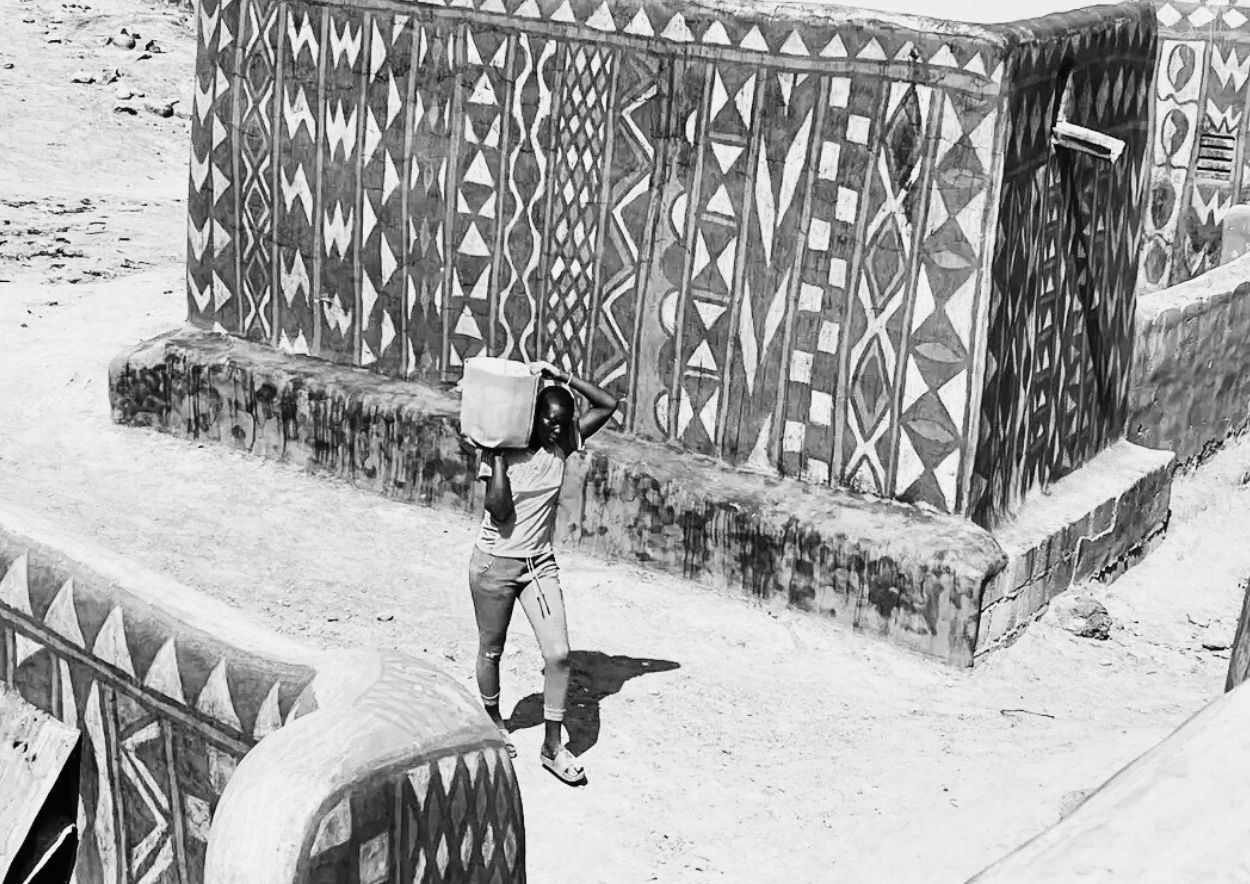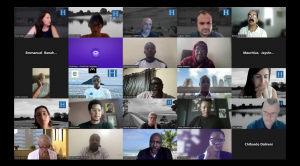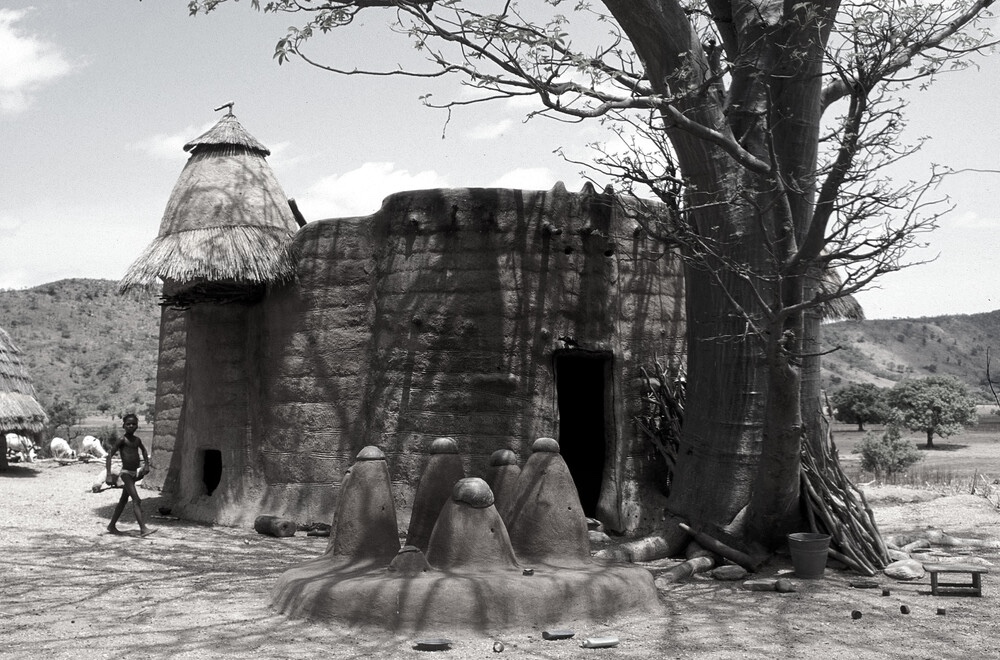Tag Archives: african heritage
Sixth Online Networking Convening of Africa Grantees
On 10 December 2025, the HERITΛGE Africa Grants Team held the sixth online networking convening for grantees awarded in 2024. The meeting brought together grantees, HERITΛGE staff, members of the Re-granting Committee, representatives of the Mellon Foundation, and other African donors, with 45 attendees. After welcoming remarks by Richard A. Brown, seven grantees shared their projects. These ranged from documenting traditional boat-making in Mauritius and supporting cultural teaching in Senegal to safeguarding heritage industries in Sudan and revitalising museums in Chad and Ghana.
“Hearing the diverse experiences of colleagues across Africa reminded me that we are part of a wider heritage community, facing similar challenges, but also drawing inspiration and new ideas from one another.”
After the presentations, grantees’ refelcted on presenting their work and learning from one another. Participants discussed how the experience of sharing their projects encouraged them to reconsider elements of documentation, community engagement, and youth involvement in heritage work. Several grantees noted that hearing from others sparked new thinking about how to approach their own initiatives and opened possibilities for collaboration across contexts.
The sixth convening highlighted the strength of these gatherings in creating a space for peer learning, shared reflection, and mutual support, reinforcing HERITΛGE’s commitment to fostering heritage initiatives across Africa.
The participants and projects featured were:
-
Dr. Jayshree Mungur-Medhi, Mauritius: ‘Living the Heritage in Vieux Grand Port – Documentation and Transmission of Traditional Boat Making’
-
Abdoulaye Diao Noumounthi, Senegal: ‘ElleSolaire Cultural Academy’
-
Dr. Gafar Ali Fadol Ibrahim, Sudan: ‘Safeguarding Living Cultural Heritage in the Sudan at the Time of Conflict: Documentation of Cultural Industries (Pottery and Basketry) of Sinkat Locality in the Red Sea State’
-
Yaw Mankatah Asare, Ghana: ‘Abibikwantuo (AK) Indigenous Sustainability Hub’
-
Ngague Gaga Taguimbi, Chad (presenting on behalf of Ganda Bini Djabou): ‘Restoration and revitalization of the Sarh Museum’
-
Prof. Pastory Magayane Bushozi, Tanzania: ‘Conservation and Promotion of Cultural Sites in the Eyasi Basin, Tanzania’
-
Isaak Aduko, Ghana: ‘Protection, preservation and promotion of Fort Fredericksburg’
This was the sixth out of six planned events aimed at showcasing projects funded through our Small Grants for African Heritage Projects initiative, made possible through generous funding by the Mellon Foundation. 75 projects have received around $1 million in funding. You can read more about the specific projects on our Africa Grants page.
Fifth Online Networking Convening of Africa Grantees
Building Peace Across Borders in East Africa. Members of women’s forums are enjoying their newfound voice and role in cross border peace building. USAID’s PEACE III supports key actors, including local leaders, women and youth in the targeted cross-border cluster areas to deepen and broaden transformative social reconciliation processes.
More:
Photo Credit: Tine Frank /USAID East Africa Regional. Original public domain image from Flickr
On 29 October 2025, the HERITΛGE Africa Grants Team hosted its fifth network convening bringing together grantees, HERITΛGE staff, Re-granting Committee members, representatives from the Mellon Foundation, and other African donors. 65 people attended the meeting. The convening differed from previous ones as it included simultaneous interpretation to accommodate Francophone speakers, who represented the majority of presenters, which was valuable.
The session opened with welcoming remarks from Richard A. Brown, with eleven grantees then presenting their work. These covered projects in Guinea, Benin, Burkina Faso, the Democratic Republic of Congo, Niger, Cameroon, Uganda, Nigeria, Egypt, and Côte d’Ivoire. Projects ranged from mapping and documenting cultural heritage in Guinea to the restoration of cultural sites and the promotion of sustainable tourism and heritage museums across Africa.*
Following the presentations, participants joined breakout rooms organised by project type. These smaller groups facilitated discussions on challenges faced during project implementation, opportunities for collaboration, and strategies for engaging local communities and governments. Participants shared experiences, best practices, and networking contacts, highlighting the value of HERITΛGE workshops and the importance of training in areas such as heritage marketing, documentation, and sustainable tourism.
This fifth convening reinforced the importance of these gatherings as spaces for knowledge exchange, peer learning, and fostering collaboration across diverse heritage projects. It also highlighted the need to maintain inclusive practices, such as interpretation services, to ensure all grantees can actively participate. HERITΛGE will continue to provide support and explore structured plans for future in-person and virtual engagements.
*Lansana Keita, Guinea: ‘Mapping and documenting cultural heritage of Guinée Forestière’
Franck Serge Wouantègnon Alokpowanou, Benin: ‘Renovation and innovative management of the Ondo sacred forest of Pobe’
Louis Hermann Tinwende Nikiema, Burkina Faso: ‘Restoration of Cultural Heritage’ (‘Restauration du Patrimonie Culturel’)
Katalay Katy Bumba Jean-Paul, Democratic Republic of Congo: ‘Transformation of the colonial residence in a tourism and community center’
Adiza Amadou, Niger: ‘Preserving the Tradition of Handweaving in Niger’
Dr Loumpet Germain, Cameroon: ‘Conservation and Enhancement of a Biodiversity Site Among the Pygmies (Sauvegarde, valorisation un site de biodiversité chez les Pygmées)’
Mfitundinda Herbert, Uganda: ‘Enhancing Indigenous Batwa Livelihood Through Cultural Heritage Experiences in Uganda’
Geofrey Junior Waako, Uganda: ‘Cultural Oasis: Jinja’s Sustainable Heritage Hub’
Adeoluwa Onamade, Nigeria: ‘Sustainable Project to strengthen Bilikisu-Sungbo heritage’
Hassan Refaat Hassan Badawy, Egypt: ‘Documentation and Marketing of El- Quseir’s ICH for Sustainable Community Development’
Edi Ako Victorien Constant, Cote d’Ivoire: ‘Cooperative Training in the Animation of a Community Agricultural Museum in Agboville: The MCAA Project’ (‘Formation coopérative à l’animation d’un Musée Communautaire Agricole à Agboville : Le Projet MCAA’)
This was the fifth out of six planned events aimed at showcasing projects funded through our Small Grants for African Heritage Projects initiative, made possible through generous funding by the Mellon Foundation. 75 projects have received around $1million in funding. You can read more about the specific projects on our Africa Grants page which is continually being updated.
Fourth Online Networking Convening of Africa Grantees
On 3 September 2025, the HERITΛGE Africa Grants Team held the fourth online networking convening for grantees awarded in 2024. The meeting brought together grantees, Heritage staff, committee members, Mellon Foundation representatives, and other African donors, with 76 attendees.
After welcoming remarks by Richard A. Brown and an introduction to the day’s agenda by HERITΛGE Director, Evangelos Kyriakidis, eleven grantees shared their projects. These ranged from protecting Ethiopia’s Azwa Maryam Monastery to revitalizing Namibia’s Oshikulu Cultural Village, and from creating inclusive museum spaces in South Africa to empowering community-based tourism in Rwanda.
“What we are learning, we are impacting our communities and our leadership to say that this is what we are, where we are going and all of these have been made possible just because we are part of this fellowship”
Moses Mkumpha, Malawi
Following the presentations, the conversation turned to capacity-building and HERITΛGE’s training programmes. Past participants shared how these courses had strengthened their projects, expanded their professional networks, and provided practical skills in fundraising, project management, and heritage conservation. Grantees from Sudan, Nigeria, Malawi, Botswana, Zambia, Ethiopia, South Africa, and Namibia* described how the trainings had been transformative, enabling them to achieve higher success in proposal writing, project implementation, and community engagement, while also inspiring leadership and innovation. The breakout discussions allowed participants to continue sharing experiences and reflect on how these opportunities enhanced their work and impact.
The fourth convening highlighted the value of combining financial support with professional development, reinforcing HERITΛGE’s commitment to strengthening heritage initiatives across Africa and fostering a growing community of heritage professionals. The session left participants energised and motivated to apply their learnings, collaborate across borders, and continue advancing the preservation and promotion of African heritage.
The participants and projects featured were:
Getaneh Addis Tessema, Ethiopia: ‘Protection and Promotion of Azwa Maryam Monastery’
Francis Kwarayire, Ghana: ‘Re-use of Old Cocoa Shed Building as a Contemporary Art Museum’
Aisha Pearl Mayekiso, South Africa: ‘Creating inclusive museum spaces, products, and services for all’
Adebunmi Akinbo, Nigeria: ‘Restoring Ilukwe House – A research center promoting Nigerian heritage’
Gasenone Kediseng, Botswana: ‘Khama III Memorial Museum Kitchen and Restaurant’
Dounama Biri, Niger: ‘Art Culture and Heritage of the Women of Boubon Niger’
Foday Dampha, The Gambia: ‘Rehabilitation of Genieri Community Museum and Building of Human Capacities’
Ahmed Magem, Nigeria: ‘Restoration, Preservation and Protection of Tangale Culture and Heritage’
Ursha Faal, The Gambia: ‘Fulani Heritage Haven’
Greg Bacunzi, Rwanda: ‘Empowering Youth and Women in Community-based Tourism’
Serak S O Shidhudhu, Namibia: ‘Oshikulu Cultural Village – Revitalizing Cultural Roots: Safeguarding Heritage, Empowering Communities’
This was the fourth out of six planned events aimed at showcasing projects funded through our Small Grants for African Heritage Projects initiative, made possible through generous funding by the Mellon Foundation. 75 projects have received around $1million in funding. You can read more about the specific projects on our Africa Grants page.
Third Online Networking Convening of Africa Grantees
 On 25 June 2025, the Africa Grants Team hosted the third online networking convening for the 2024 grantees. 65 people attended, including the grantees, HERITAGE staff, Regranting Committee members, and representatives from the Mellon Foundation and other African donors.
On 25 June 2025, the Africa Grants Team hosted the third online networking convening for the 2024 grantees. 65 people attended, including the grantees, HERITAGE staff, Regranting Committee members, and representatives from the Mellon Foundation and other African donors.
HERITAGE’s Richard A. Brown opened the session with a warm welcome, followed by Dimitra Gialesa of the Network Convening Taskforce, who thanked attendees and introduced the agenda. In this convening, twelve grantees presented their projects. The projects showcased a wide range of heritage work across Africa, including efforts to revitalise historic sites in Tanzania, promote cultural heritage in Cameroon, empower refugee women in Uganda, and build heritage museums in The Gambia.*
Following presentations, participants joined six breakout rooms organised by project type and facilitated by HERITAGE staff. These smaller groups encouraged peer discussions on common challenges and potential collaborations, with one member of the Grants Committee joining each. Discussions ranged from capacity building and craft training, restoration and documentation, to infrastructure support and heritage tourism. Encouragingly, connections were made that may lead to future collaborations.
Overall, the convening reinforced the value of these gatherings as platforms for connection and shared learning, while also highlighting challenges in participation. The team plans to maintain thematic breakout groups and encourage more focused discussions on challenges and collaboration in future convenings.
*Kelvin Fella Tanzania: ‘Improving Community Wellbeing to Rescue Bagamoyo Old
Stone Town’
Nfor Blessing Mbontu Cameroon: ‘’Smart Sacred Forests Reforestation Project’
James Agbor Ayamba Cameroon: ‘Protecting Heritage Through Promoting Culture’
Margaret Dear Kasande Uganda: ‘Supporting women and refugees in the Rwenzoris to
acquire skills and earn income from traditional basket weaving’
Hassoum Ceesay The Gambia: ‘Fort Bullen Revitalization’ (presentation delivered by
the manager Mamat Sallah)
Habab Idriss Ahmed Idriss Sudan: ‘Documentation and Protection of Hillat Dongola’
Elhadj Ould Brahim Mauritania: ‘Preserving Haratin Bondja and Medh Musical
Traditions (first stage: Adrar Region, Mauritania)’
Nfamara Tamba The Gambia: ‘’Kubuneh-Galloya Heritage Trail (The Gambia)’
(presentation delivered by Dimitra Gialesa at the end because Nfamara was facing
internet connection issues through the meeting and he was disconnecting regularly)
Sanya Gilbert Lesotho: ‘Empowering Communities: Sustainable Tourism, Heritage
Preservation and Economic Empowerment Project at Kome Caves’
Anaclet Karangwa Rwanda: ‘The Development of Imanzi Heritage Village’
Hewan Goitom Berhane Ethiopia: ‘Addis Ababa Heritage Buildings Photogrammetry
Documentation Training and Exhibition’
Bala Saho The Gambia: ‘Building A Heritage Museum and Training on the Collection
and Management of Artifacts and Oral Traditions’
This was the third out of six planned events aimed at showcasing projects funded through our Small Grants for African Heritage Projects initiative, made possible through generous funding by the Mellon Foundation. 75 projects have received around $1million in funding. You can read more about the specific projects on our Africa Grants page which is continually being updated.
What Future for Sacred Places in the Age of Climate and Virtuality?
By Ibrahim Tchan,
Climate change does not only erode landscapes or materials. It threatens gestures, rituals, stories—what binds people to their territories, to their ancestors, to their sense of belonging. In the face of this, should we simply document, archive, observe the loss? Or should we begin to invent new forms of presence, capable of extending the breath of heritage where the ground becomes unstable, practices disperse, and memory fades?
This is exactly the path we are currently walking with the Takienta, the ritual dwelling of the Batammariba people, in the Koutammakou region (Benin/Togo).
We are actively engaging in a multi-layered process using virtual reality, 3D modeling, photogrammetry, telepresence, augmented reality, and now drone-assisted AI for inventory and sacred landscape mapping.
But our aim is not to freeze this living architecture in pixels. It is to make it accessible in new ways, to enable active transmission, especially where collapsing soils, displacement, or disrupted rhythms make ritual continuity difficult.
We are working to ensure that initiation rituals like the Dikuntri (for girls) and the Difuani (for boys) can still be felt, understood, and experienced—even remotely, even tomorrow—in a world where physical presence may no longer be possible, but where spiritual connection can be reimagined. This is no longer just about preserving form, but about ensuring that communities—especially younger generations—can continue to “inhabit” their heritage, making it a living resource in an uncertain world.
This approach raises critical questions:
➡ How can digital tools become instruments of cultural adaptation, not substitution?
➡ What ethical, inclusive, and grounded models can guide us in this transition?
➡ Which stories, practices, and examples should we be sharing—urgently?
We offer this not as a finished solution, but as an open invitation to explore, test, and co-create. To engage in cross-disciplinary collaboration, to rethink how we care for what matters most. Because heritage does not preserve itself. It must be carried, transformed, retold—together. And if the tools of tomorrow can help honor the memory of our origins, then it is up to us to use them with care, clarity… and commitment.
*Ibrahim Tchan is a Heritage and Climate Change Specialist Researcher/Project Manager working in Benin
Second Online Networking Convening of Africa Grantees
On 30th April, our Africa Grants Team hosted the Second Networking Convening for recipients of our Small Grants for Africa, bringing together over 60 participants from across Africa for a virtual session. Our small grants initiative is made possible with the support of the Mellon Foundation.
The event featured grantees, HERITΛGE staff, members of the Re-granting Committee, and representatives from several foundations, including the Mellon Foundation, ALIPH Foundation, Arcadia Fund, DRK Foundation, and Kaplan Foundation. 12 grantees presented projects from Algeria, Eswatini, Ghana, Nigeria, Rwanda, South Africa, Tanzania, Uganda and Zambia. They showcased a broad range of community-driven heritage work, from the restoration of Keana Salt Village in Nigeria to the conservation of rock paintings in Uganda.
“Heritage and culture are so important in many different ways in addressing social issues, economic issues and environmental issues”
Justin Garrett Moore, Director, Mellon Foundation’s Humanities in Place Program
After the presentations, Justin Garrett Moore from the Mellon Foundation highlighted the significant role that heritage plays in addressing various societal challenges. “We’ve supported this work because heritage and culture are so important in many different ways in addressing social issues, economic issues, and environmental issues. And I think all of the work you’ve shared here today has been showing jus the power that work has,” he told attendees./
The convening concluded with a breakout session, where participants were divided into smaller groups to discuss their projects more informally. It was also a great opportunity for participants to network with each other and promoted collaborations between individuals and groups.
This was the second out of six planned events aimed at showcasing projects funded through our Small Grants for African Heritage Projects initiative, made possible through generous funding by the Mellon Foundation. 75 projects have received around $1million in funding. You can read more about the specific projects on our Africa Grants page which is continually being updated.
- 1
- 2




